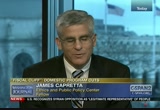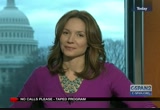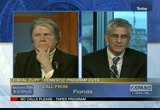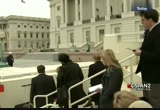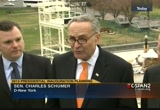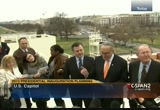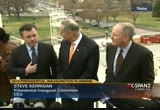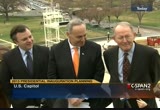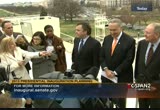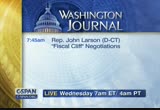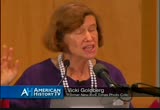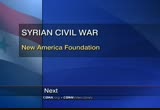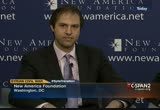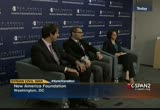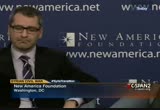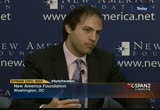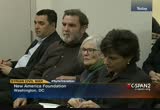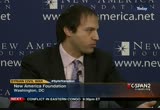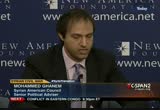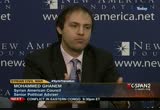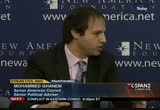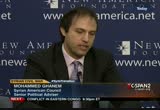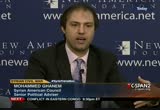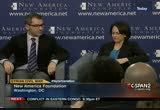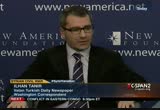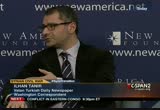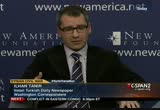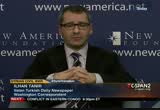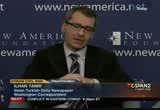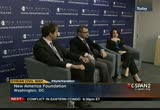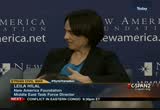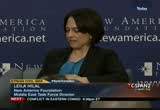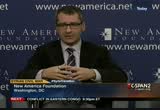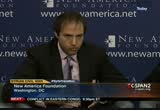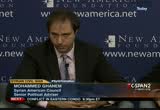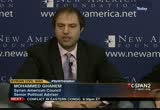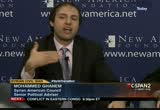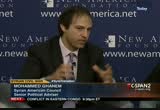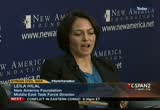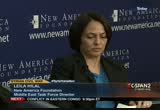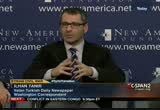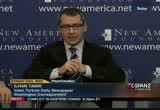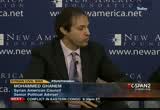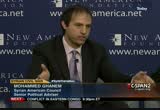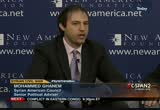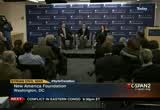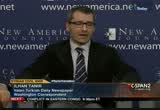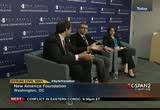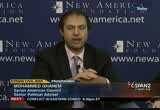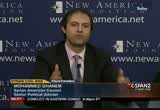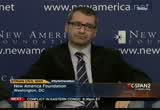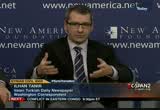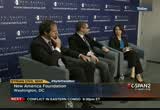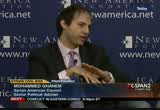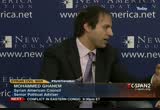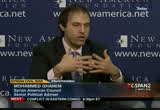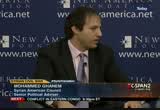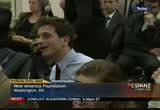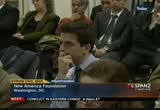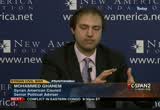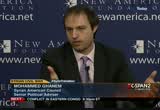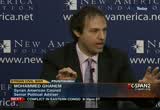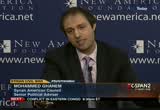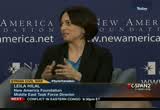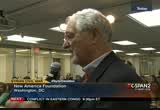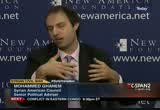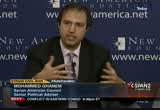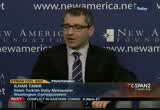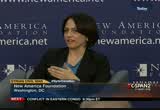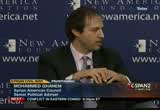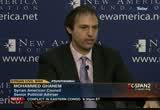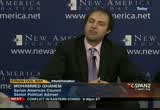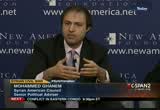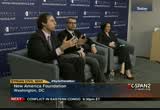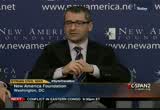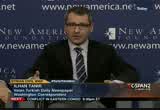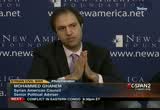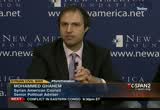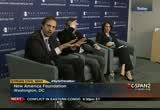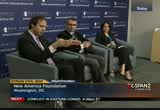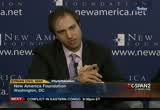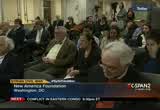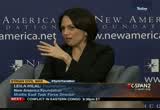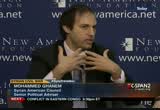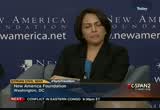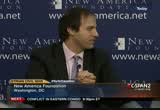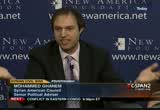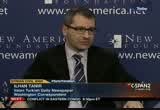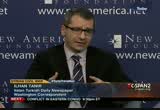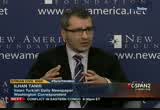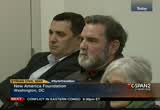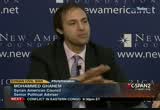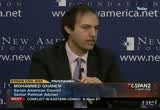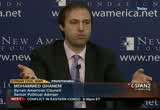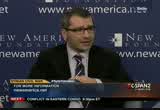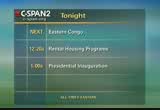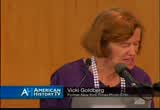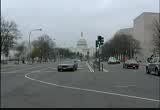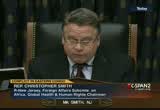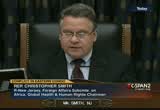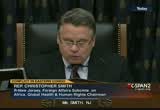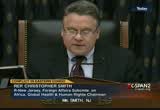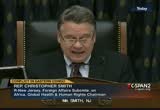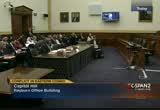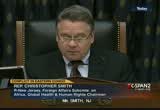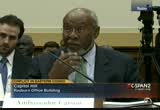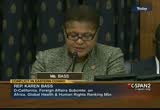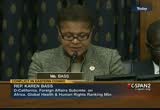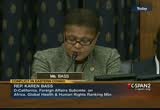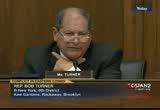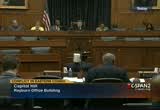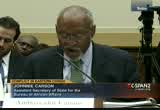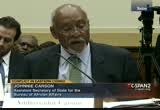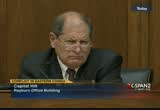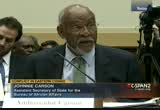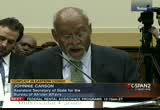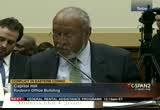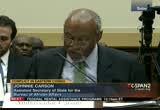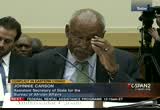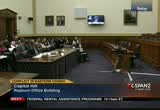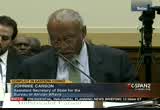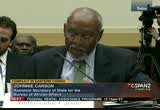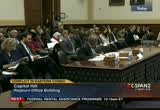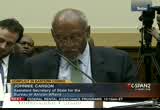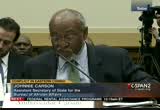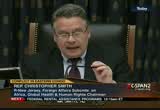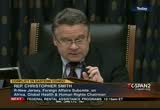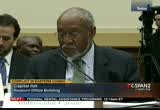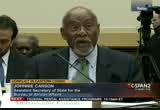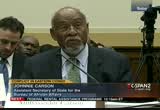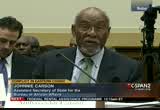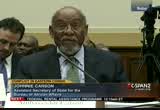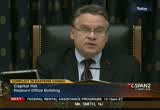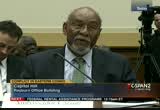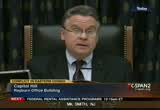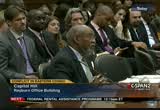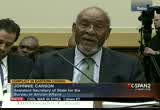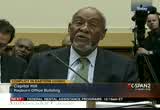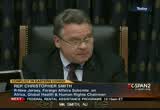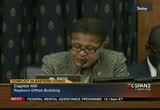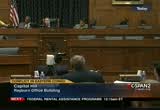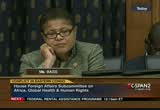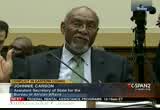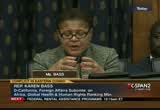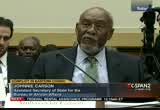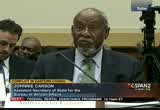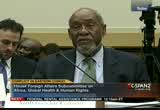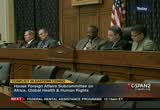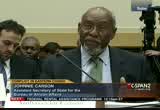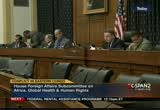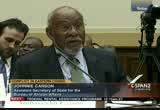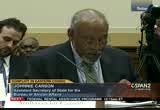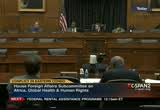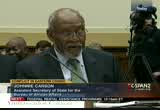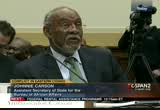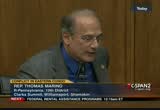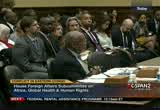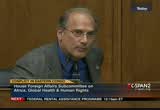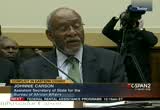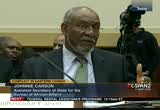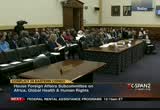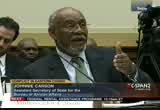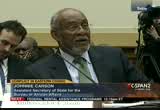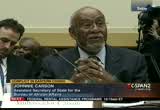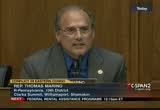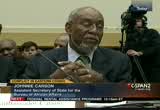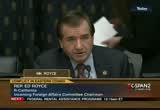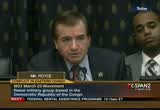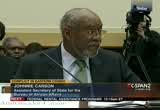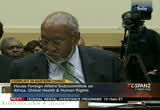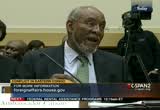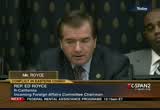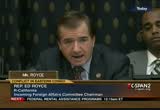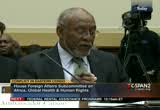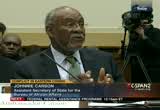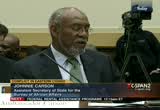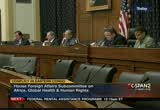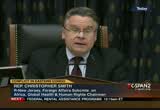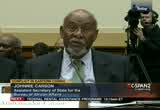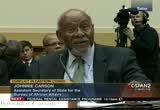tv Tonight From Washington CSPAN December 11, 2012 8:00pm-11:00pm EST
8:00 pm
involved is different from a private enterprise. the ability for fraud to creep into government programs financed by taxes is slightly higher than a private enterprise we've got people watching shareholders of their own personal money at risk. so i think it's endemic in government that there's a certain amount of problems in this area. in medicare that is probably the order of $60 billion per year in wasteful and fraudulent payments, which is a huge number. in part because the medicare program is ebullient claims here for medical services. the ability to track this and figure out which ones are right and wrong is limited at the federal level. there's a certain things things that go on a government that are very difficult to get all the way out. the caller is absolutely right that should be a top, top priority. ..
8:01 pm
8:02 pm
each year secured or fire protection so that our citizens there, people who key figure with them -- >> host: you agree, jim? is is a drop in the bucket when we are talking about this? >> guest: you know, it is billions and billions of dollars. the budget is very small. moreover, i am not an expert in this area, but i am of the view that the amount of money that is being spent trying to position the united states have influence in the world and bring about the values that we have in this country, i am not really a big fan of saying that foreign aid needs to go.
8:03 pm
>> host: unfortunately it is time to go, but thank you so much james capretta for joining us. >> since 1901, the joint congressional committee congressional committee on a macro ceremonies has been responsible for the planning execution of the inauguration of the president of the u.s. capitol. >> we are glad you are all here, this is the platform were the inauguration will take place. it is on schedule, it is on budget. our job, senator alexander and myself were in charge of this part of the inauguration. it is the presidential inaugural committee. it is also known as pic. let me review some numbers and specifics. the first inaugural on the west front was ronald reagan's ceremony in 1981. the person in charge of building
8:04 pm
the platform is steve ayers, the architect of the capital. the platform will be about 10,000 square feet. the same size as the platform in 2005, which was the largest platform ever built. as you know, on this there will be 1600 people were comes to this platform. it has to be very strong. the former president, joins you, governors, and the diplomatic corps. one of which comes from brooklyn, one comes from near chattanooga. it is a bipartisan concept
8:05 pm
inaugural. the platform is made whole with specification so everyone can see pretty well. the design began more than a year ago. construction began in september. >> thank you, jack. george washington was supposed to have said that the most important inauguration was not the first one but the second want to see if we could reaffirm or transfer powers. whether we are republicans or democrats come we are looking forward to this. >> can we have mr. kerry did say something? >> thank you, senator. i am grateful to be here on behalf of the presidential inaugural committee. the partnership we have formed has been terrific and is integral to making sure that the events that we do here and throughout the capital this weekend is functioning in this
8:06 pm
great moment in our democracy. we are thrilled to have such great partners. they are waiting to help us execute with what the president and vice president want to see. we are grateful to have such strong partners. >> okay, ma'am? >> if you could let us know, this is paid for with housing and senate money, it will cost about 1,200,000 total, which is less than last year. we are coming in under budget, even though it will hold as many peeps best people. >> [inaudible question] when you make of the president's decision to accept unlimited.
8:07 pm
>> we are not going to get into that here. it is a nice and happy day, and you can ask me that another time. >> the private ceremony on sunday, we are concerned about whether or not we will see -- >> you know, it is similar to what happens at other times. this is the some kind of time that the president has had to take an oath. sometimes a president has had to take the oath on sunday and ceremony on monday. it will be exactly in keeping with history. there will be a brief event. i will tell you that by private we mean that the white house is working on details. >> the constitution requires it to be on the 20th, that is a sunday. it is a sunday this year. it comes out on a monday. which is actually martin luther king day. which has a very great appropriateness for this inauguration.
8:08 pm
>> the white house press corps and press officer working on what that will be. [inaudible] >> the white house is working with the press corps on all of that right now. >> thank you very much, everybody. it is nice to see you. hopefully we will see by the inauguration. thank you. [inaudible conversations] >> tonight on c-span2, a discussion about the ongoing civil war in syria. that hearing a military conflict. then a panel on housing assistance to low-income
8:09 pm
renters. >> on tomorrow morning's "washington journal", a look at whether medicare and social security should be part of negotiations on fiscal cliff. we will talk with john larson on how house democrats take on the issue and stephen ola and christina martin and david john of the heritage foundation, on the long-term solvency of social security. "washington journal" is live every morning on c-span at 7:00 a.m. eastern. >> the white house was very controversial as most americans were. >> it was designed for appellate, but americans were having a pellets. it was not particularly awe-inspiring.
8:10 pm
a european diplomat told the congress that it was neither large or are of the awe-inspiring nature. to . >> "new york times" critic kitty goldberg gathered photographs in history on sunday evening at 730 eastern and pacific on c-span3 american history tv. >> president obama this evening said the u.s. now recognizes the main syrian opposition group as the legitimate representative of its country's people. turkish journalism has reported that the new america foundation. two men have returned from the country into the to the west can
8:11 pm
do more to help the syrian people. [inaudible conversations] >> welcome, everyone. welcome to c-span on the audience. i am very excited about today's events. we have two people with us that have recently come from syria that are able to give us an insight on the perspective of something that is hard to come by. in the context of the syria. to my far right is mohammed ghanem, he has a bachelor's degree in english literature, as well as graduate degree in translation from damascus university. he went on to earn a degree in
8:12 pm
conflict transformation from the center of justice and peace at the eastern mennonite university in harrisburg, virginia, and he has fought as assistant professor at princeton university. he is a long-term activists. he was active in the early days as a strategist for nonviolence. he is currently taking on the role of administrator consoles which we intend to focus on today.
8:13 pm
to my immediate right is ihan tanir. he is a washington dc correspondent for the times daily. and it is a nationwide turkish newspaper. he is also a nonresident fellow. he stayed in the suburbs of damascus, and in early august he was in turn three and has had the time to be with the syrian army or the rebel forces. ihan tanir has written extensive articles.
8:14 pm
with that introduction, i would like to start off with a general question. we are going to run the session in a question-and-answer style. i'm sure the people in the audience have many questions to ask for. i will start off with just a few and send it over to the audience. starting with mohammed ghanem, the news that we are receiving in the united states is very much focused on the issue of chemical weapons and the emergence of islamic forces and the question of whether or not damascus is about to turn. i want to ask you, given your experience and what you have witnessed in northern syria, what is it that we are missing from this area? >> this is a narrative about
8:15 pm
citizens of syria and how they are coming together, trying to take a step towards governing themselves. this narrative of this emergence of a society -- that is missing. it would be helpful to remind our friends in the audience what we are talking about today is a country that was experiencing a crisis of huge proportions. according to the u.n., many destroyed in syria. many homes in syria are just gone. there are activists that i work with the talk about these elements in northern syria.
8:16 pm
[inaudible] throughout the country, gives us the access to compromise. syrians are coming together, trying to fill the vacuum or gap rather than being created by a contracting element. i thought that was very interesting because syrians don't have experience. governments govern themselves, they have govern themselves and the 1960s to be highly centralized. the state is maintaining control of everything in syria, in that
8:17 pm
aspect, -- we want to find out more about this narrative in syria. it was hosted in aleppo. aleppo was the perfect choice because it is arguably the most populated city in syria, it is in northern syria. there is a local part of the city, the countryside as well. the countryside and the city make up the government -- [inaudible] of syria. all of the perl -- the 70% of
8:18 pm
8:19 pm
way, i am using aleppo is a case in point. to be honest, i thought that i would need -- [inaudible] we were very le we were very lesson and surprised. the operation we encountered was a lot more sophisticated than i thought. they held elections. the chairman was a highly educated person with a phd, doctor [inaudible name]. they also started the committee on the local administration and the committee on finance making sure that every penny is accounted for.
8:20 pm
we are working on a number of projects to stabilize the city and help our transition. >> can you say the two words about the relationship between the civilian counsel in the military and [inaudible] >> three weeks ago, they coalesce under the aleppo revolutionary concept and it was headed by the secretary-general and colonel. so all of those groups, so far, those groups will maintain their separate identities. they are all fighting under the banner of this council is headed up by the kernel.
8:21 pm
i would say that the relationship between the civilian counsel and military council is -- there are two of them. they are under two different styles. the fsa -- everyone depends on it to keep them from entering the city, and so forth. that is the cooperative aspect. it is long-term, it is going into the future. you have civilians and an emergence of a society that is trying to govern the services of the city as needed. this is one of the services that they are trying to provide, taking out the trash.
8:22 pm
okay? but you also have people with guns and, you know, they are a source of power. so i also see them as competing and going into the future about who will have the upper hand in the system. now, both the military and the civilians or severely underfunded. it is a competitive, long-term, and cooperative short term.
8:23 pm
8:24 pm
8:25 pm
8:26 pm
8:27 pm
-- [inaudible] the first time that they -- they had an agreement on the members. there were three components one of them they called the revolutionary [inaudible] people who organize the protest. but i am also -- the second they called the features -- educators. the teachers. the issues from the beginning,
8:29 pm
they have other issues that they have tackled. >> it is very interesting because in aleppo, you have an elected consul and you had an appointed one before coming together and organizing themselves and leadership and implementing it according to a consensus. and i think that is an interesting sort of pattern that one can find with elements and one of the challenges facing these councils in terms of the long-term sustainability. clearly, they are not operating according to any standards as to
8:30 pm
what is appropriate in considering unity. so, we asked the question of sustainability. the u.s. and syria meeting tomorrow in aleppo, the u.s. is preparing, according to reports, to recognize a transitional government and out of this new syrian revolutionary coalition. if there is a transitional government that is recognized, what will the relationship be in regards to the council, will be more ad hoc? and are these local ones sustainable -- and how does it
8:31 pm
8:32 pm
[inaudible] the first challenge is that -- that the civilians have to be able to defend themselves. it sounds like we are discussing what is meaningful as we are trying to survive. i think this is a very good question. whether or not the civilian efforts work depends on whether the civilians are empowered.
8:33 pm
8:34 pm
8:35 pm
this much as much as possible, given the circumstances there. it would be a guarantee against human rights violation on the part of the opposition. they were working with judges and people with degrees in law. also, the secretary-general. but again, -- again, the funding for that system was also an issue. the third thing that we are working on is they started out with a small medical council was elected on the medical board and that medical council alone, just making back to dc, one of the --
8:36 pm
i grew up in syria, we were not even allowed to talk about government. that was off-limits. he would've gone into a big trouble if you talk about a state of emergency. people were not allowed to get together on a regular basis. all of a sudden, i see civilians, operating at such a sophisticated level. but the harsh reality was the intelligence. and i don't believe on the work and the component about the relationship with a transitional government. so the 14 seats from the 14
8:37 pm
governors or provinces of syria, that are part of this national coalition, that represent all syrian opposition, they are already a part of this group and the recognition is extended to them and the efforts. the only crucial part that we need to be taking care of -- >> so what it takes to empower the people organizing themselves his money or to buy uniforms? >> [inaudible] >> okay. so it is more important for empowerment in a country that is going through a fundamental revolution.
8:38 pm
so i have a proclivity to address this question. how are the civilians on the ground in syria able to have legitimacy? are they successful at it. what are they trying on. is it related to the [inaudible name], the respected elders, is it a person with -- or doesn't matter? doesn't matter because of his historical authority in the community, and maybe there would be a tendency to promote an electoral process.
8:39 pm
so how would you relate to this question of legitimacy that stands on the ground and looking forward? >> i understand what how -- how everyone reacted. [inaudible] in the process of justifying the election, they have [inaudible] it is valuable as a fact that we can argue about what kind of growth there is, but these type
8:40 pm
8:41 pm
coalition body. the people, i mean, -- they can -- they can recognize anyone that the revolution will influence this. >> is it a military that has an influence on the ground right now? >> in the minds and eyes of the people, they are the ones that are doing the actual work on the ground. so yes, they are the ones with legitimate points. i spoke with people in aleppo as often as possible. and i thought that they all respected the work of everyone
8:42 pm
that i talked to. respected the work of the council. and they saw the service and they wanted to leave the transition into syria. the legitimacy is the topic. there is a huge issue about fuel in syria. so, if you can provide insight on this -- on the other hand, your history, and once again the legitimacy. don't be under the impression -- no one should be under the
8:43 pm
impression that these people were underground for so long that they are just trying to get off the ground. there is no reason to expand the services that we are providing. i would not say the elections were perfect. [inaudible] there was a woman who was able to -- she reported about the elections that happened.
8:44 pm
in the history, whether or not you can meet the need, what should be done -- what stage in the revolution have the revolutionaries or whatever -- you are full of these aspects of the citizens. but without funding, and i'm about to happen. >> okay, let's open it up to the questions from the audience. we have one question doctor. the gentleman with the microphone? three speak louder? hopefully we will understand this. [inaudible question]
8:45 pm
>> i would like to know about the world that the syrians are playing currently? >> i have seen in both places, and in the village -- there were no women members of the council. for stated reasons, i believe in ceded sovereignty. the woman that i stated to have a purpose in damascus -- as well as in aleppo, i have seen.
8:46 pm
[inaudible] i did not see the woman. >> i would tend to agree with that. things are developing at two levels. they are developing in terms of the civilian counsel, bringing up across the liberated areas, but they are also developing politically speaking on a national level. so at a national level, the national coalition that formed, women are playing a significant role. so one of the deputies, vice
8:47 pm
president of the national coalition is a female and is a national activist in syria. and i hold a special admiration for them. and a i know a lot of men at the early stages of the revolution that are concerned about this. in the heart of damascus, i also know that women in those liberated areas are playing the role behind the scenes in terms of medical schools and so forth. i came across an example when i was in those underground areas. in terms of women sitting on the council, the council that i
8:48 pm
encountered had no women on the council. but i would not say it is because women -- they wanted to marginalize women. i would say this because it is highly dangerous perform this kind of job right now sit on the council and go back and forth between what they called the occupied areas and liberated areas. and so forth. i'm hopeful that things will change in the future. and by the way, and for many to highlight, the chairman said we don't want to give people the
8:49 pm
impression that we are taking advantage of the future of the elections. as of now, the country is still in the midst of water. everything is far from perfect. >> please, one more point. what is taking place -- [inaudible] there is a lot of interesting insights. there are many reasons for women who have elected to stay at home. [inaudible] >> okay. well, you have anymore comments?
8:50 pm
>> hello, i'm from the simpson center. i'm wondering if you can talk about the composition of the local council and the extent to which there is membership across the sectors come and do these councils offer hope for secretary of operations? crossed secretary and operations? >> the part of the segments in the beginning, for example, the youth and the elders have complications. they were able to focus the vision towards -- they have this at the end of july --
8:51 pm
8:52 pm
8:53 pm
>> some of the areas are muslims. in areas where you have -- for example, in areas where you have most people that are christian, the christians are the ones that [inaudible] in terms of life, i met with the command and they have liberated the minorities in syria. and they have their own language and culture and traditions, but they also speak every day. again, it is nonferrous.
8:54 pm
they are the ones that are running this. let me just say one more thing. in terms of the city or countryside -- the majority of the people on the council itself, the majority of these people were from the countryside. however, everyone was from the city. >> so is it correct to say that the people are organizing themselves into a governing council within their latest scheme of things? >> that is a bit tricky. it depends upon how it is happening naturally. her example. one of the villages. the majority of those in that city are christian.
8:55 pm
but i would not say it would be because you can only be ahead of a council because you are a christian, but the majority is christian. but again, a lot of areas in syria, they are different and important. >> they were not able to elect the leader because of this. >> the council used to be the main opposition, but the last meeting we attended in delhi, about 25% of the political opposition like minorities and
8:56 pm
now, also when it comes to the national coalition for opposition, they are also playing a role. the first ambassador that the national coalition had, it was extended. the first ambassador that was appointed was an opposition figure. >> i have one more question. over here? >> thank you. thank you all for a very fascinating discussion. we talked about the relationship between the civilian opposition and armed rebels, and i'm hoping that you can speak to the relationship of both the national coalition, particularly in aleppo were a lot of them have rejected the coalition aspect.
8:57 pm
8:58 pm
a battalion and then they became [inaudible] see you can see that the italians -- [inaudible] in this state, it is issued and talked about in this way. >> this is a good segue into this. the civilian councils are trying to wrestle control from the others in a way that would not create conflict, trying to minimize conflict as much as possible. that is why i am saying that the relationship is cooperative and also competitive.
8:59 pm
whether or not civilians will have the upper hand largely depends on whether they can lead to other areas of the and i just want to also say and shed light on further questions. so when i was in aleppo, i was able to meet the commander. i've met with the commander of the battalion's. and the council. and i think that early on, i mentioned earlier today that 80% of those fighting in aleppo, not all of those coalesced under the leadership of the council. so you also have 20%, and those 20% are either criminal gains, trying to take advantage of the chaos. and you also have the small extreme groups.
9:00 pm
9:01 pm
on justice to be accurate. however, that was quoted. when i watch the video, not the main victors in the pdu. they were the main leaders leading the fight. so i got in touch just a few days later. the main leader -- the main fighting group in aleppo put up a video answer they don't represent us. all journalists have been there know that's true. they recognize the council formed in doha. but the challenge is i think of them as moderates. these moderates are underfunded. he used to be on mission and arms. this is very well-funded as to
9:02 pm
whether or not it can expand largely depends whether or not the 80% is the national community. >> one small point of contestation and that is they think right now it may be safe to people in syria with the two support, to align, to be included in a group that is able to provide resources because there is immediate need. but that doesn't mean that those lesions will maintain in the future syria. i think we need to be careful in how we frame the issue of assistance in terms of being able to manipulate what directions. goes in our weather is in a radical direction are not radical direction. if you look at egypt, we have no
9:03 pm
idea what's going to happen. it's a long road ahead. that doesn't negate the fact that this may be immediate the abuse and its needs, that doesn't mean that we -- we need to still think about the importance for syria and syrian interest in the longer-term. >> and needs to be done carefully. >> thank you. tom gedmin, an executive. when our sincerest two years ago and have had correspondence ever since, christiansen alloway are very concerned about what happens when things change because they run against
9:04 pm
morally, spiritually assad regime in the round of the regime. so i'm wondering, what did you find when you talk to people like that and are they participating in the councils? is really what mona was getting that as well. our part or seem to have been targets of her shoes protection now participating because they said they were against them. are really? >> thank you for your question. it can be tricky because the most minorities are shifting allegiances, and they are shifting allegiances. but in fact they know for example that not only
9:05 pm
participating in councils. some of them participate in the battle at health. you can, for example, to take about the tony's. but however, a lot of them come especially when they shift allegiances, they don't go public about that. so that's the tricky part. that is understandable because that would have huge consequences. i personally work with christian act to this. one of my best friends is a alawites activist whose mother was killed so the family was split. the father was a regime person. the mother was regime. my friend is an activist preaches mallets and syrian turkish border and her mom was killed. she thinks it was killed by her father. but anyway, we work with
9:06 pm
christian act of this from other minorities. but i cannot say when that happens were going to be seen a lot of youtube videos. that's on one hand. on the other hand, this is not like everyone to shifting allegiance. there is a delicate balance. for many conversations of people that is the regime falls, they will declare. >> obviously the post of army has been discussed over and over again. though we are not -- many people argue we are at the turning point in some ecstatic that
9:07 pm
aleppo has gone for a week. it's a -- for many reasons, for many reasons they want to stay away until this moment at least now they have this emergency and take steps to have some kind of leverage. >> the spokesperson for the foreign affairs to take those and he also belongs to a minority in syria. receive more and more of that happening every day. what i'm saying is that 10 to keep low profiles. >> to these council estate in intention to out do outreach to different communities and order
9:08 pm
do they have any protection strategies that were developing their conflict resolution programs to address these issues? >> thank you so much. this is a very interesting aspect, the conflict resolution issue. the council in aleppo, for example, one of the meetings i attended were talking about reaching out to the iranian christians in aleppo about what to do when the city had been liberated and how they can minimize perceptions by supporting the assad regime, circuit in. so i was happy with that outrage. the other thing is extremely happy with was that they were also the trying to build conflict resolution also whether. not just in aleppo, but elsewhere. soviet is a border crossing.
9:09 pm
the area has been liberated. there is a conflict train to different groups. because of that, the border crossing was not functioning. it was closed. they wanted the border crossing to the open so they sent a number of their members over. they were doing conflict resolution because there are kurds in that area. so there was also attention on sharon pension between that parent and kurds. he was on the phone because she come the sort of like functioning as a mediator, a settlement so that dispute can be settled. so that's why i'm singing, empowering those councils is not
9:10 pm
an option if you want the country to transition smoothly in that area. >> thank you. david smith. we've talked about outside influences primarily in terms of the west. you talk about the saudi's. can you perhaps give us your thoughts on the u.s. position relative to its relations with the saudi's click >> the ones that are providing the most assistance, in fact commit military assistance or not the saudi's for the qataris, but the saudi's are also providing. but i'm saying the qataris play a bigger role. however, this tends to be exaggerated. i'll share this with you.
9:11 pm
-- this is a bit tricky. i would say, for example, one main fighting group, one council as every 15 to 20 days receiving supplies for one day's worth of fighting. and that is why invariably the answer i got from different groups and not that people at the front lines have to withdraw more than that. that's why we've not been able to see deliberations. so i would say the assistance being extended is sufficient to perpetuate the conflict indefinitely, but never too quickly. so i just want to be clear on that. assistance is being extended, but it's very meager that it borders basically, relatively speaking the other parties of the conflict of the regime as their military power is huge.
9:12 pm
i was a relatively speaking it would border on nothing. that is why -- i'll share something else. the first month when i was then aleppo, the first month of the person was me in any leadership position setup be honest honest, the first month we receive salary. about $150 so people can support their families. they all have wives and kids is a worth. i'm not sure about next month. although the cibecue anon 20 months, this is the first month they had received salaries. this is unsustainable. but hundred $50 each this month. but i don't know about next month. >> are the qataris giving money to the civilian counsel? >> to civilian councils are
9:13 pm
trying to draw upon an old daughters. they're trying to draw on, for example come the rich syrians, like the syrian -- like internationally. so i wouldn't say the qataris are the main support for the council. they're welcoming support from any party. >> two points actually. in aleppo, when you go central, the fight going on at places. i was able to peek at their guns and what kind of guns they are using. 80%, 90% -- [inaudible] i don't know much about guns,
9:14 pm
but the way they look. this is supposedly the most important if aleppo is going to be important. these people don't have anything to fight for. second point again, when you talk to syrians on the ground from every part of the city, country, the understanding and perception is the outsiders are just enough to encounter and contribute. it doesn't give the age, but it does not lead them abandon. it is basically to chart them --
9:15 pm
[inaudible] >> with the question here and another one in the back. >> thank you. my name is not checked him. i am from jordan. we know there is a healthy smuggling colter. how they are doing now and if they are doing well -- [inaudible] thank you on your mark -- jordan, but also with lebanon. like i don't have a lot of information about that.
9:16 pm
i was sure it do what i know. the conditions on the border is basically very dangerous and i know that the assad regime deployed hundreds of snipers to make sure that no more high-level depictions occur because it's easy for officials to want to defect jordan and the state of turkey is a lot more convenient. so a lot of snipers have been deployed. it is a fact been inflating the country is very dangerous. basically the whole economy aspect is devastated, especially the value. in 2010, august 2010 committee
9:17 pm
syrian pound was about 46 syrian pounds. it's not 87293. so i'm not sure what the smugglers are doing exactly by now, but i know it's like committing suicide. anything that tries -- any suspicious behavior at the border would be met with a barrage of -- [inaudible] >> i assume you mean smuggling through the rubble. as i understand it, it's murky and how they are getting across and what was reaching the fighters more is money rather than weapons.
9:18 pm
>> talking about the culture of smuggling. not necessarily -- okay, the way you smuggle food and commodities. >> what i know is i was always the first questions i was asking. they're a couple of different aspects that they mostly applies from the regime. the smuggling of the guns as far as i know, was again very murky. so i don't have witnessed the non-smuggling. apparently the borders are being used.
9:19 pm
>> if you want to zero in on the smuggling of weapons, i definitely have something i can share from what i hear from fsa in damascus. so is three, four times is more difficult to smuggle into damascus. basically to smuggle things. until a few months ago, even jordanian authorities, pretty tightly. it was difficult and that's why ak-47 can cost three or four times as much. this is a chocolate things. the second source as i pointed out, buying all across them.
9:20 pm
ibm lack [inaudible] buying from corrupt officials. the third thing, basically the booty is a fixup after bottle. this has been a major resource of arms. >> question the back of the room. [inaudible] >> we can't hear you. >> and you may now? rebecca hopkins and i was hoping you could talk a little bit about what if any quick nation is occurring between village councils, regional councils. thank you. >> just 10 days ago i completed the integration of the city and
9:21 pm
the countryside. but now the council represents the entire government of aleppo. if you think about that, the more those councils are empowered, the more they have the ability to reach out to more pockets or more regions that incorporate them into the council. so 10 days ago, the city was a quote rated m. weaver speaking with one of our main contacts endless goodness for us. >> the question is from the council in aleppo to work with the council in damascus.
9:22 pm
it also come it is very council in damascus? >> damascus is completely different from aleppo. it's closing in on the regime. it's completely different. this city will control the opposition. in aleppo it is different, so the dynamic is different. however, assad is consistently losing ground. >> is there coordination between the governance of the rio? >> okay, so the council in aleppo said we want to make sure that this is a good example that can inspire the other councils in syria and turned into an example for the rest of the council in the sense that they want to be in terms only what they sent to inclusivity and others and so forth.
9:23 pm
so they wanted to turn it into an old. this is all a work in progress. [inaudible] >> i mean, i reached a few cities and was able to witness those, but the one thing i might add is there a close to kurdish. there was cooperation, but other than, no. >> i fetch you a question, right click >> we have a question here. did you have a hand? why don't we take these two questions together and then have any other.
9:24 pm
>> my name is mike. i wonder what advice he gave to the obama administration receded into the future. >> i just bought a lot about syria appeared quick question. i haven't yet heard any discussion on what the local councils might be doing to track down potential, the actual war crimes. where does that stand as a result of the council? >> the second question first? so the second question, so civil society in general right now in syria was not restrict it to these councils are merging into related areas. people of different professions are organizing themselves according to profession. for example, when i was in
9:25 pm
istanbul and i shared that she were with me in istanbul. so there is like a conference on the blood of act to this across the borders into turkey. when for example with the council of three judges. they have defected and said were not going to continue decisions made by the assad regime and have organized themselves into the regime of free judges. if you're interested i can connect to. very specifically documents and one of them gave like a speech that was very painful for me to hear explaining how solvay which
9:26 pm
which -- every act of was five h. [inaudible] so lawyers as well. there's also the council of free lawyers coming together under trying to reach out to ssa and the council. they're really working with the council. so yes, they're under the impression the democracy is only limited to councils. in fact, civil society is emerging after half a century. >> okay, thomas question is what should be up on the administration do for syria? >> just today --
9:27 pm
[inaudible] [inaudible] but it looks like it could be a terrorist organization. it will designate ms organization today in the middle of everything. they are filled with fighting the assad regime. designated them as a terrorist organization, i just don't know how this will help the rebel cause in aleppo. this is just one example. the obama administration has made a decision to stay away and unfortunately, his mission was held in the beginning of 2012
9:28 pm
because the first of the year the president had started the campaigning year. so when you look at it, there are reasons for the u.s. to stay away, but the one thing that overlooked the way that they can intervene in gain leverage is not only putting boots on the ground. this is the understanding many people are here when you talk about cults in syria. it is basically giving i'm not how to associate the actions that have been fighting for over years.
9:29 pm
there are many that have been proved to be trusted with people. i don't thought how much this administration tried the good people. when you talk to officials. how do i know who's good and who's bad? if they are trying to find your man now, it is too late already. but the problem in a year -- [inaudible] this is my last point. i personally know a couple people who have been living in the u.s. for 20, 30 years, financing and fighting themselves. at least they could be easy to find. they always complain from the administration. >> said the u.s. government
9:30 pm
provide more support into the insurgency? in the form -- >> heavy army. >> recommendations for the administration. it's quite urgent. so they either step in and fill in the void or they will jeopardize u.s. national security interests in syria -- [inaudible] syria is one of the alleys of the united states. in terms of how to do that, first they need to empower those independent counsel. so the u.s. send aid relief to the contrary. but all of that goes to organizations such as the u.n.
9:31 pm
and other international ngos. they need to work with the council. they're good for humanitarian reasons. they are either calling the shots or how to call the shots in future syria appeared to increase influence over the outcome of the region. second of all you empower the democracy emerging and help shape what comes after assad. if you are meeting the needs, you can have leverage. if you're not meeting the needs, you would create sentiments that are not very separable to you because it would be seen as the part that has abandoned. another recognition is the french and british are working with the council on the ground. the french ambassador is very act days.
9:32 pm
[inaudible] they provide direct aid to the council themselves. the british also do the same and the french and the british sent recognition to the national coalition of one, paris comment saying also recognize them. so we need to catch a tiered we are way behind. second recommendation is this has been going on for 20 months. we don't have that tries. i don't buy that. there is a better process. some are in contact with the military part of the country. they designate a group so that they know who's good and who's bad. they need to engage the system more proactively. otherwise, they designate a source organization.
9:33 pm
we'll continue they need and i don't always syria but the cleric. so unless you engage, even if you don't know the good guys and bad guys, you need to start somewhere. unless you engage the situation, you'll have less influence going forward. but engaging the situation, and being proactive about what's happening before it's too late. whether or not the u.s. hopes with that will determine what about in the future. >> one quick point. washington and doing a lot of good work and i believe in perception they are very well-liked by the syrian people.
9:34 pm
it is not the case. the first time is very recently to start condemned the u.s. and iran. if it is not taken it is going to be the condemning u.s. friday. so obviously but the situation is doing is not enough in the hearts and minds of syrian people. >> we are way over time. i want to thank everyone for coming under speakers for sharing your personal insights. [applause]
9:35 pm
9:36 pm
in fact come in 1821, a european diplomat told the congress that was neither large nor awe-inspiring. but the answer, the congressman gave said the building said his purpose, if were larger and more elegant, perhaps some president would be inclined to become its permanent residents. >> a state department official testified regarding conflict in the democratic republic of the congo today at a congressional hearing. he said the obama administration is working closely with international part is to end the violent conflict between the congolese army and backed by
9:37 pm
rwanda. rebels captured the eastern congo city of goma. this is just two and a half hours. >> the committee will come to order. good afternoon. i apologize for the lateness in starting. today will regard the policy in the democratic republic of congo. this conflict was exacerbated by rwanda's interventions in neighboring eastern congo as documented by the release of three united nations reports this year. these reports confirm rwanda supported militia who have lavished in continue to plague this region. the state department was unavailable to testify at her september 19. on this issue and the promise that the time to follow up with available to testify. in the aftermath of genocide, they've turned a blind eye to reports of resources from the
9:38 pm
drc and support issuing congo and its people. it seems the guilt of the clinton administration's colossal failure responding effectively as they did not commit genocide in rwanda has led to subsequent been reluctant to criticize her one day. with these u.n. reports on that government's behavior in the drc, as an ngo letter points out come the united states is now out of steps with our european allies would cut aid to rwanda because if they are interference in the drc in a recent reports. the group of experts also recommended imposing sanctions on responsible rwandan officials including the defense minister. additionally the drc has failed to ensure that its military adequately provide security for
9:39 pm
citizens. in fact, national forces for the democratic republic of congo is alleged to be a perpetrator of human rights violations. security sector reform is critical in the drc and the united nations organization stabilization mission has not been able to train military elements that too often terrorize their own people instead of protecting them. at this point it is vital to understand what the administration intends to do about the u.n. report on rwanda's violation of the arms embargo, nonstate groups in eastern drc and how this impacts u.s. relations with rwanda. furthermore, we must know how to evisceration tends to deal with the drc government invited his deficiencies and security sector reform. this hearing will take a comprehensive look at who is responsible for the security and eastern congo beyond the two government and militias. most attention is being paid to
9:40 pm
the rebel movement in eastern congo justifiably so. in light of the recent seizure territory and overall destructive impacts on the people of eastern congo. however their are reportedly as many as two dozen armed groups terrorizing congolese in these regions. according to a 20 subreport, commodities of war, nine of these militias are believed to be the most permanent. they range from those for the focus on rwanda or uganda, today was formed in response to perpetrators for a genocide in rwanda to the dear the ortho singly focused on the drc itself. whatever the region for their founding, their terrorist eastern congo and the drc as a whole. we consider the flow of arms that enables their ongoing reign of terror.
9:41 pm
according to the u.n. office for coordination of humanitarian affairs, secured in eastern congo has placed approximately 2.4 million people nationwide, especially in the east. despite long-standing conflict in eastern congo, the oc hj estimates the majority displaced persons typically return within six to 18 months of their initial displacement and require minimal return assistance. while that may be true, it does not account for the kind of life congolese will have once they return to their homes. women continue to be targeted for gross abuse of the drc. a study that appeared in the american journal of public health included 48 women and girls are raped every hour. this year more than 100 females in the drc will have been raped
9:42 pm
before our hearing today adams. the rejection by their families, husbands and communities cast a cloud over their effort to re-create communities by militias in the drc. this is an issue that must be addressed by congolese themselves up any help to provide for the outside sooner rather than later. since our hearing in september, and 23 has made significant gains in territorial control, occupying thoma for 10 days for moving southward of bukavu. international pressure played a major role in the group having its advanced southward than to try and from goma town by early december. president joseph kabila government and in 22 rebels reportedly have agreed peace talks sponsored by the government of uganda. there have been peace talks in
9:43 pm
peace accords in the drc before and they did in whole as we all know. all this effort achieve a lasting peace? the drc is home to an abundant wealth including 70% of the worlds vital components and other electronic commitments. 30% of the reserves and vast deposits of cobalt, copper and bauxite. unfortunate, deese has attracted bidders and fuel civil war. oil has been discovered in eastern congo and can be found to prevent the drc's blessings from turned into curses. the tragic genocide in rwanda in 1994 as a lasting repercussions in the drc. since the 1880s, resentment over the perceived influx of people considered foreigners has contributed to conflict in this region, including two regional wars.
9:44 pm
various figures in the region have used this antipathy for political participants and supporters against their perceived opponents. can the interethnic problems in the drc neighbors be finally resolved that a lasting peace be achieved? our witnesses today are well-positioned to address questions regarding a path forward for sustainable peace in the drc and the obstacles that lie in that path. it is time now to find a way to bring in an to the horrific suffering of the people of the democratic republic of congo. and that's my friend and colleague for her opening. >> thank you, mr. chair and thank you for your leadership on this issue in holding this important hearing. while this committee held a hearing on the drc not too long ago, recent event in eastern congo motivated closer examination of this current crisis. i want to especially thank assistant secretary ambassador carson and other witnesses are offering testimony to today's hearing.
9:45 pm
i would like to commend many of you sitting in the audience for your tireless work towards peace and justice for those affected by the past and current crisis. the concerns have been heard and the committee will elevate the status of drc supersedes the international attention needed to bring about lasting peace and stability. myself, members of the committee and colleagues in the senate are deeply concerned with omicron reports of human rights violations, recruitment of child soldiers and the involvement of drc's been eastern region. which is just scraping for the international community to work on common interest towards the resolution of a crisis that goes well beyond and 23 spirit we must not look at the current crisis in some civil, political or military vacuum. credible commitments to long-standing stability to take hold by your stick transparent and accountable processes be put
9:46 pm
in place that can address reforms at all levels. i went to be clear on this point. if we are to cnn to the the violence and instability, holistic reforms are desperately needed at all levels, including politically and economically. they must also see a dramatic reevaluation of social constraints to reform civic engagements. the results of the deeply flawed 2011 election may bear significant challenges that must be addressed if we are to see a dramatic and positive change of course. ambassador carson, i'll be interested to hear what steps the state department will take to address these serious challenges that remain unaddressed. let me remind the committee when his essay. failure to achieve stability has torn families apart and shown clearly that the actions of those who have no concern for life and have not been brought to justice. for too long the drc has been ravaged by war. for do decades coming yesterday
9:47 pm
with the national congress for defense of the people. today's and 23. what will it be tomorrow? we stand by and allow peace to be held together by empty promises of the violent, raped, must be brought to an end. what is troubling about the recent conflict by the drc's territorial integrity. while the uganda government denies such involvement that the koran i.d. of evidence suggest otherwise. the closest to mark story began urging that all efforts be put towards establishing mechanisms that are the foundation not only the drc, but throughout the region. i ask a letter being sent to president obama be submitted circulate by representative mcdermott. this calls for establishment of the special u.s. envoy and african union envoy.
9:48 pm
the purpose should be clear to present international stakeholders towards a unified policy to address all aspects of this regional crisis. also what did she miss a second letter to be sent to president obama and secretary clinton signed the organizations including africa faith and justice that were, global witness, open society foundations, refugees and among many others. point for special envoys, global leadership to engage constructively in the political process. thank you and a look for today's testimony. >> and the other panelists? >> thank you, mr. chairman. i would like to raise a point. throughout the conflict the mines remain open.
9:49 pm
minerals, gems, rare earths provides financing for the conflict. it's a motivation for a great deal of it. who's buying this material and what do we know about the chain of dollars in material on an international basis? is there anything we or the u.n. or the african union are doing to choke this off? >> i now introduce or witnessed in the u.s. department of state of state, ambassador johnnie carson serves as assistant secretary of state in african affairs by position he's held this may of 2009. investor person is a distinguished career over 37 years, including kenya, uganda and zimbabwe. ambassador carson esser district of the subcommittee many years ago and as a corps volunteer in tanzania, he is the word from
9:50 pm
the u.s. department of state. mr. ambassador, the floor is yours. >> chairman is met, ranking member bass, members of the committee. thank you for the time to testify in the crisis unfolded and eastern democratic republic of the congo, the drc. the humanitarian situation in the congo is the most volatile in africa today. an estimated 5 million people have died in the years since the second regional board began in that country in 1997, 1998. millions more have been forced to flee their home. the people of north and south
9:51 pm
kivu provinces in particular have replaced cycles of conflict and shocking atrocities. the november 20th fall of goma today i'm 23 rebel group provided a stark reminder that in spite of the international community's major investments and humanitarian aid and peacekeeping, and the underlying causes of the conflict in the drc remain unresolved. the congolese government has failed to prevent affect security governance is in the eastern provinces and political and economic tensions persist between the drc and its eastern neighbors, particularly rwanda. since the m23 rebellion erupted
9:52 pm
last spring, the united states has worked closely with international and regional park yours to mobilize a comprehensive response aimed at preventing a further deterioration of the situation. secretary clinton, ambassador reiss and undersecretary wendy sherman had spoken or met with senior congolese, but one didn't come ugandan and u.n. officials to advocate for a rapid and peaceful resolution to this crisis. in the u.n. security council, we have taken action to ensure that 550 and 23 is most abusive commanders are now under targeted sanctions. we have also stressed the need to hold accountable all of those who commit human rights abuses and atrocities. i myself have traveled to the drc, rwanda and uganda by
9:53 pm
november 24 was my british and french counterparts to deliver a clear and common message that the congolese rwandan government must work together to stop this crisis works towards a sustainable resolution of underlying issues. all three governments reiterated to s. their commitment to these goals. we also stressed that there should be no impunity for senior m23 leaders who are under icc and a hint for international sanctions in human rights abuses. the m23 but not be the threat that it is today without external support. they continued to discourage outside parties from providing any assistance to the m23
9:54 pm
movement. there is a credible body of evidence that collaborates key findings of the group of experts reports concerning rwandan government support to the m23, including military, logistical and political assistance. the british government has recently indicated that it shares this assessment. we do not have a similar body of evidence that uganda has a government policy support for the m23. they send this evidence, we have repeatedly pressed rwanda to halt and prevent any and all forms of support to congolese armed groups. looking forward, we expect all parties including rwanda to cease any support to m23 and
9:55 pm
other armed groups. abide by the compile of a chorus of november 21 and 24. and work constructively with its neighbors and international community and take affirmative steps and the commanders responsible for abuses in order to reach him except to pull political agreement. we asked the government to ensure that supplies to the m23 do not originate in our transit through ugandan territory, including from individual officials who might be at them on their own. the department continues to monitor closely all potential sources of external support and we will continue to respond appropriately, including by reviewing our assistance to
9:56 pm
deter the support as the situation develops. we are taking a number of other steps and cons it with other international partners as a part of our comprehensive response to the current crisis. first and foremost, we are monitoring humanitarian needs and mobilizing an appropriate response. the humanitarian situation in eastern congo remains deplorable as it has been for years. recent attacks by the m23 and other armed groups have displaced hundreds of thousands and left some areas of north and south inaccessible to humanitarian response. the united states provides more
9:57 pm
than $110 million in humanitarian assistance and refugees, displaced persons in conflict affected civilians in fiscal year 2012. we have urged donors to respond to consolidated appeal to the democratic republic of congo. second, the international conference on the great lakes region known in the icglr, african union and security council have all demanded that the m23 refrain from further offend as operations to remain out of goma. while the congolese government has agreed to hear the grievances of the m23 in
9:58 pm
discussions now taking place, we continue to call for accountability for the m23 most abusive leaders. we will speak out against the forcible recruitment and the other crimes of the m23 soldiers and rebels. third, we believe that president kabila, khatami and the savini must continue to engage in direct talks to address the underlying causes of instability in the region as well as the potential drivers of progress. we support the special envoy to facilitate a long-term solution of these problems and we will consult with the u.n. secretary general about this.
9:59 pm
we work to ensure that any agreement within between the parties is transparent, sustainable and enjoys the support and commitment of the region. fourth, more must be done to protect civilians in the eastern drc. we enter security council members and contributing countries are reviewing options for improving the un's ability to protect civilians and implement aspects of the potential, reasonable settlement. this, the drc government has the primary responsibility is for protecting its territory and all of its citizens. we are urging president kabila to take clear and full measures to ensure that the soldiers of
10:00 pm
10:01 pm
10:02 pm
entirety of the drc, including progress through electronic and mobile banking and building the capacity to mass atrocities and human rights violations. we need to build on the steps, which have been greatly setback by the current m23 rebellion. the decisions based today are decisions that will have a direct impact on what happens over the next several months as well as the next several years. it will effect the promotion of the concept we have promoted for
10:03 pm
sustained operations and the resistance army of that has operated in the northern part and in the central african republic. today's crisis is a tragedy. but it also offers a genuine opportunity to help the congolese people said a more sustainable course towards peace and stability in their own country, as well is with their neighbors. the framework for action at national, regional, and international levels that i have outlined today, could help enable the peoples of the region who escaped the recurring cycles of conflict, which have hampered progress in the eastern congo for nearly two decades. thank you again for the opportunity to testify this
10:04 pm
afternoon. i have a longer submission for the record, which you may have. i look forward to answering any of your questions. >> thank you so much. without objection, your false statement, that is referenced as before, it will be made a part of the record. sir, a couple of hours ago, at least online, and regarding a newspaper posting an article entitled obama accused of failed policy over romana support of rebel groups, and it points out the letter that we are all aware of. the 15 organizations that take the administration in the task policy, the article begins about think tanks of barack obama, accusing him over a failed rwanda policy support and the democratic republic of congo,
10:05 pm
would imposed sanctions. the letter says important occurrence, as the situation calls for, the u.s. response to the crisis has patently failed with other western nations. since m23 was created in the spring of 2012, u.s. officials continue to place they engaging the one that and a constructive dialogue. this approach has failed to change one's policies, as involvement in the recent take over of goma, and of course -- not of course, but the rwandans say that the reports are fabricated and the u.n. group reports that the coordination of the rebel movement, as well as the major military operations and providing troops. they recommend and posing nations against these officials. you have just testify that there
10:06 pm
is credible evidence that corroborates key findings to the group of experts, including evidence of significant military and logistical support from as well as operational and political guidance from the rwandan government to the m23. you also point out we do not have similar evidence that uganda has a governmentwide policy. now, we all know that the house side push this legislation to get past, it was authored by senator barack obama, the government act of 2006, says that we should withhold action suit destabilize the drc. i am wondering if you can tell us, do the actions of rwanda marriage the withdrawal of
10:07 pm
funding given the corroboration of evidence as you have pointed out to withholding aid to rwanda in exchange? >> first of all, i reject the headline that the administration has failed to speak out against the m23. >> that is not what they said. >> they talk about a failed policy and not speaking out against foreign trade. >> okay. i think that what we see and do is a part of the policy efforts. and i reject that judgment. i must reject a pretty soundly. first and foremost, we have been engaged on this issue since the mvemba dizolele rebellion began in april of this year.
10:08 pm
since april, yesterday, we have at all levels of the u.s. government, we have been working for the greater peace and stability into the current fighting and current withdrawal of m23 from goma, and discussion invalid region. let me just give you a quick catalog. certainly between april and september, the ambassador wendy sherman and i were in contact electronically with leaders of the region. i also met with leaders about
10:09 pm
this issue at the african union summit in june. in september of this year, secretary clinton invited the president's of wanda and the drc to breathe with her on the margins with the u.n. general assembly come, to find ways in the current rebellion. we participated there at that time as well in the special meeting on the region. in addition, wendy sherman traveled to the region in october. that was the meeting with the
10:10 pm
president, and this is one of the most important of her set of meetings out there. she met with the president for over five hours. shortly after that, we actually did take some action because we had information that we believed indicated rowanda's support. we had military financing to the government. i traveled to the region for several days just after
10:11 pm
thanksgiving and traveled to kampala into other areas to meet with all leaders of the countries. i also traveled with my british and french counterparts. in addition, we have sanctioned m23 leaders and we are about distinction more m23's leaders and officials, and we have continued to advance our diplomacy, as well as speak out about what has been happening in the region. mr. chairman, with all due respect, anyone who would suggest that we have been inactive -- >> again, mr. secretary and
10:12 pm
mr. ambassador, no one is suggesting inactivity. it is the policy itself that is underskirt in the and being criticized by the organization. let me ask you this, are there sanctions contemplated or have they been imposed upon any officials. >> no, but we have implemented sanctions which have cut off foreign military financing. to the government and military. >> it is very public and it has been terminated. >> you mentioned the u.s. envoy? >> we actually have a u.s. envoy for the great lakes region. it is mainly ambassador barrie
10:13 pm
walkley, he has been on the job for nearly a year. the ambassador barrie walkley is off i'd to serve as our envoy there. and he has previously served and he travels to the region quite frequently. so there is an envoy out there already when the global with the levels that he is working hard on this issue along with other officials. >> understood. the gravitas of a presidential envoy would grasp a -- a stronger message to those
10:14 pm
people. let me ask john prendergast. it is manifestly garelick. when the curtain is pulled back, we want to look behind the united nation's security council, it is revealed to be shockingly effective. how we respond that? >> i think i don't need to respond for the entire international immunity. i know that mr. printer brass, we have been longtime colleagues
10:15 pm
and friends and have a great deal of knowledge and expertisee region, but i would submit that the actions that we have taken reflect a high degree of interest in the situation. >> would troops be replaced and comprise a credible force to protect the drc and rwanda border? >> last week the countries met. they agreed to send some thousand troops into the dnc -- what i it should say is the international court spent 1000
10:16 pm
troops were pledged by dar es salaam, tanzania from the other 3000 were going to be drawn from a southern african standby force. i do not know the capacity or the ability of the countries in the region to pull those troops together. but what i would say is that the u.n. currently has this an introduction of a new force, and it should be done very carefully, and cooperation and collaboration with the united nations. it should be well thought out and well resourced and one
10:17 pm
should consider whether it is not better to augment and integrates those new forces into a more expanded and exerted u.n. force them to create a new force in which there are a large number of military and rebel forces. it could create some concerns about the operational effectiveness and operational overlaps. >> i, too, have been in goma myself. i know how unbelievably unstable that area is. part of the problem that i believe that there is insufficient troops deployed even on a large u.n. situation,
10:18 pm
and let me ask this question. there are rumors, maybe they are just rumors, that the administration thought delay things and attempted to soften criticism of rwanda involvement in 2013. can you can speak to that? >> i cannot. >> one final question, do rwandans join the u.n. security council next year? is that they are on what policy will be, especially since they will be on the security council? >> no, it does not. just as the other 15 members of the security council understand. >> thank you, very much. i want to ask you can speak to
10:19 pm
the background of m23. i just wanted to know if you had any insight as to what the ultimate aim is. what is the motivation for them to continue? also, the idea. you mentioned that there would not be impunity to the commanders -- have you reintegrate any of them? how big is the m23? >> okay. >> how many soldiers are? >> okay, speaking to the first question of the aim and motivation, i believe that the current group of m23 rebels want to be able to maintain themselves as consolidated
10:20 pm
military units in the eastern part of the drc. i think they see themselves as guardians of the population and i suspect that some of them have political ambitions and try to work with top officials and local in administrations in the east. beyond that, i do not know whether aims and motivations are. i know that when the rebellion started back in march and april, there was a clear desire on the
10:21 pm
part of the m23 rebels, not to be moved on the part of the drc into other parts of the country. and their officers did not want to leave the military commands in which they have been assigned since they have been following different commands. impunity -- i think there should not be impunity for those leaders who fall into three categories. those who are clearly dealing with international sanctions already, and for those in which there is evidence for a growing
10:22 pm
body of evidence as far as war crimes and rates grow throughout the last seven and eight months. i don't have the exact number, but initially when they broke away in april of this year, the number was probably no more than 1000. today, that number has probably swelled for a lot of reasons. but it is not a region of people. >> okay, when you were saying previously that one of the things that led to the recent rebellion was the president trying to scatter the troops. because how can you ever have
10:23 pm
peace, even if you did have sanctions against the commanders, how can you have an army where you have a faction that wants to separate and operate independently. i don't know how that works. >> well, it doesn't work very well. but let me say that there have been a number of countries that have effectively integrated rebel groups into their military. and in the process that have made those more consolidated. i think there was an effort by the m23 not to be reassigned to the drc, and i don't think you
10:24 pm
can effectively operate a reintegrated military group, is what it wants to, in regards to what the government wants to be. >> exactly, you also thought about the ongoing tension about the dnc and the possibility of troops coming from south africa secure the border. where are the tricks? are they already on the border? >> no, they are not. they are scattered throughout the eastern part and they are
10:25 pm
there largely to detect refugees and displaced persons. they are not, in fact, monitoring or working and observing along the border. but our towns and villages and refugee camps, and displaced persons, respond to crises and help the congolese military when they are called upon to do so. >> could you speak to the impact that conflict minerals and what they might be playing as a role? especially in providing resources to the m23?
10:26 pm
>> and they have been a factor in providing resources to rebel groups in the eastern part of the congo. but quite honestly, as serious as conflict minerals are, they are probably not they are probably not the primary reason for the primary crisis. they are one of the underlying systemic reasons why the crisis can continue. and i think the current crisis can be found with the so-called grievances in discipline of the m23, and the support that they have received from outside of
10:27 pm
the country. >> finally, how would you assess the response of the u.s. government to the humanitarian crisis reign could you describe that? >> as i noted in my testimony, we have given an access of $110 million in humanitarian assistance. >> maybe you could explain with some of that is for? >> these dollars are used to provide food to displaced persons and to provide the food and assistance to refugee populations and it is to provide shelter and shelter material and blankets and also to provide clean and affordable water, and also to provide prophylactics
10:28 pm
from malaria and medicines for colorado and hygiene. >> this one more question. what would you like to see from congress, and how can we be helpful in this situation? >> congresswoman bass, i think that the hearings such as this one, they give us an opportunity to indicate to you what we are doing and they also give us an opportunity to hear from you what things you think we haven't been doing that might be useful to do to improve the situation. >> without objection, a
10:29 pm
statement to be made a part of the record. >> thank you, chairman. thank you, ambassador for being here today. mr. ambassador, i researched shows that some countries -- we have given $1 billion over the last 10 years to rwanda and not to uganda. can you explain any amount that has been reduced given to either country and how much? >> well, mr. congressman, we have certainly in the last six months reduced foreign military financing to rwanda by some
10:30 pm
$200,000, and this would've been monies that the rwanda military could have used for the financing and purchasing of equipment. we have not reduced any of our development assistance money to rwanda, and i might say here that rwanda does a remarkably good job of utilizing its foreign assistance resources. probably more effective than most countries across africa are. they do a very good job using that money to provide health care and agriculture and education to their people, and they do get very high marks for
10:31 pm
that. we have not touched any of their developments with money. >> how do you draw the distinction -- did you say 200,000? that is a drop in the bucket. $200,000. i think the remark from the prime minister or the general, $200,000 is nothing. it doesn't bother us at all. so it doesn't seem that we are very serious about this. and how is the so-called remainder over the 10 years, less than $200,000, who disperses that? >> i'm not sure the billion you are referred into. >> research shows that the u.s.,
10:32 pm
it has been reduced, it has been reduced this year by $200,000. if you believe that billion dollars over a two-year period, it is nothing over an annual basis. how can we guarantee that even though there is a reduction of $200,000, and you say, i believe you say to the military -- correct me if i'm wrong, it is all wonderful. >> it is not credible. let me just say that in 2012, it has just concluded and we have provided rwanda with some $195 million in assistance. this money went primarily into
10:33 pm
health and agricultural programs. rwanda has used assistance dollars extraordinarily well. probably better than most other african countries and developing countries. >> how do you -- >> moreover, we are not providing them with check or with cash and we worked through ngos and international development agencies. and there is a high degree of accountability for all of the funding that we have given to
10:34 pm
the rwandan government. their utilization of foreign assistance in an effective manner, it is really not a question, or an issue. because in that regard, we have to be frank and honest, and they do a very good job. we don't give them cash. we don't write them a check.bu s effectively utilized for the purposes it is intended for. >> i understand through my research and contract but there has been a great deal of hijacking of these resources by groups that as m23, and using them for their own purposes were selling that to buy weapons. do you have any information on that?
10:35 pm
be i am not aware of that whatsoever. >> has the u.s. had any contact directly or indirectly with any m23 leaders? >> no, i am not aware of any contact between u.s. officials and m23 leaders. along with other diplomats, we have acted as observers, but i am not aware that we have } any m23 leaders. >> are there any players that are directly involved for whatever reason?
10:36 pm
>> no, not that i am aware of, certainly not. we met leaders have swelled over the last several months. for what reason? >> functions from recruitment of individuals in the community that they have captured and taken over. the recruitment of young men, all of these have contributed to the expansion of their numbers. >> you started explaining the reason for the crises.
10:37 pm
particularly, with m23's origination. >> well, m23 grows out of the organization called the sadc, which was integrated into the congolese army back in march of 2009. most of these individuals were a part of a rebel movement and most of them were in origin. in order to bring an and two previous group and the government of the prc, they brought them into the military
10:38 pm
and an attempt to make them a part of the army. they broke away in april of this year. i might add that not all of the cndr members from 2009 and before it broke away. some of them remain in the army. but the principal reasons for their decisions to bolt and run, they claimed it was a failure of the drc government to live up to the agreements of march 23, 2009.
10:39 pm
they wanted to move some of leadership to other parts of the country. he announced that he would try to arrest one of the most notorious of the cndr leaders that have been integrated into the army, and that was all of these reasons that have a lot to do with the disgruntlement within this rebel fashion of the background to the current
10:40 pm
crisis. >> chairman, two short questions. mr. ambassador, you stated that the eight that we are supplying to rwanda via ngos, how can we guarantee that any of that is not going into regions controlled by m23? >> i want to again separated drc from rwanda. any of the eight we have given to rwanda has been misused or mis- channeled into the hands of rebel groups. the issue is not about the effective utilization about a band aid resources.
10:41 pm
this is not at issue. i have no doubt they are using their resources well. but it is not across the board, and it is not direct assistance. so we work with ngos and international organizations and we honor what we give and they use it efficiently. it is not being misused, and in the areas of the drc, we are providing only humanitarian support and assistance as humanitarian support and assistance is going to organizations, mostly u.n. organizations through the programs or the development assistance of the international united nations or through save the children or others.
10:42 pm
>> is that an audit that the state department conducts? is that an audit that the ngos give the state department? >> we can provide you with a full answer to this. i cannot tell you when they did the last one, with respect to these programs. they conduct routine audits to ensure that there is accountability. again, that is not an issue here remap okay, how do you get the attention of a country like rwanda and uganda from supporting m23 by not stopping aid to the country whether it is for humanitarian needs for not.
10:43 pm
>> by engaging them continuously, diplomatically, a high-level, and by doing such things -- we cut off financing if they persist -- >> i do not need to be facetious, and this could be more rhetorical than a question that you have to answer, but how is that negotiating going remap. >> it has been like any set of negotiations. sometimes much longer than any of us would like, but we know that persistence over the long run pesach. >> is your position on, will the u.s. keep the plan with an operation right now and continue
10:44 pm
trying to research this and negotiate is -- at what point o you stop. how many have to die? >> we can only facilitate and encourage. we can only profit and control and push peace in the effort to bring about peace and stability. it is always in the hands of those who are our adversaries. our designer is to get them to see reason and to see it sooner rather than later. and to also understand that the persistence of conflict and violence only means hurt and
10:45 pm
violence for people. but it is not in our hands. we can only do as much as we can to bring people to the table and encourage them to see reason. >> it seems that this situation is not getting the attention that i think is required from the united nations as well. thank you, chairman. >> without objection, the information quested by mr. marino will be made part of the record. >> okay. >> thank you, chairman smith. let me just ask ambassador carson a couple questions. one, just going to the mandate, i think that the force they are of m23, the militia is about 2100 people from the press
10:46 pm
accounts. i know that the french have a perspective here that the ability to secure the safety of the civilian population could be addressed by a more robust people. >> i was going ask you that question, and the second question is when ask you goes to involvement with m23. as i recall, it was not for the u.s. to do so at the time be involved with m23, but something, we have sort of taken
10:47 pm
the position where it seems that we have taken the position that we are taking the view of rwanda. just your observation on those two points. >> chairman royce, thank you for those questions in your continued interest in africa. the response of those questions. let me repeat a part of my testimony first that you may have missed the beginning.
10:48 pm
[inaudible] there is a critical body of evidence that corroborates a group of these reports by experts that are about the m23, including military, logistical, and political assistance. >> ambassador, you do that very well. my only question is that is about resolution 2076. perhaps it should have been there, but you could not have been more explicit than what you were. and let me just ask you about the proposed alternatives to ensure more civilian safety with the respect to the mandate.
10:49 pm
>> mr. chairman, the current mandate is for some 20,000 u.n. peacekeepers. currently that mandate is under subscribed by approximately 2000. i think that we have a force level of approximately 17,700 individuals. certainly it would be desirable to see the full complement of the mandate mat. it certainly would help to allow unesco to carry out its responsibility.
10:50 pm
following the aftermath of the current situation in goma, and in the eastern part of congo, i think i made reference in my statement to the fact that it would be useful with a re-examination of the effectiveness of the force and whether the mandates were other responsibilities are being met. but the force is under subscribed by approximately 2000 people. >> thank you, sir. the last question i would ask you goes to the screw. the allied democratic forces national army for the liberation of uganda, which has been around for a while. he goes to this issue of rebel
10:51 pm
groups increasingly joining forces beyond the national borders. this particular group has done some work and they have done a bombing, for example, july 11, 2010. it killed over 70 people. you have this nexus, i think there is any converted catholic -- [inaudible name], he was in sudan. in sudan, he met osama bin laden. through the initial work with these organizations, he put together these own visions of his that word was they were
10:52 pm
about change. you know, to carry out attacks like this one. i was going to ask you about that phenomenon. you have these organizations were part of his support network come from this effective congolese, and people from throughout the region to join the cause becomes sort of transnational, and began working, in this case, with al qaeda as well. ambassador carson, anything you can do to bring me up to speed in terms of organizations like this, frankly the weight is based right now -- we have the same phenomenon spreading.
10:53 pm
>> is your chairman, three quick points on that. first of all, it is absolutely essential that all of the states in the region agree and commit themselves not to harbor or support or defend and not to provide equipment for sustenance for training two rebel groups operating against leaders of neighboring state. this is one of the problems that we face today with the m23. it is also a problem that we face with the allied democratic forces. >> this is incumbent upon all of us. incumbent upon every state in the area to do this. you get that, we could do have a
10:54 pm
lot of support from rebel groups. indeed, they have been operating eastern part against uganda. the government of the democratic republic of the congo needs to do everything it possibly can to not allow groups like this are operate out of them from their territory. i am not in any way accusing them of aiding and abetting. it is the fact that they don't have security and control of the territory, it effectively allows
10:55 pm
us to go on. but it needs to stop. it clearly needs to stop. the third point, the suspected leader of the allied democratic front, we have sanctioned the gentleman and the travel and financial sanctions on him in response to the very criminal things that we know that he is responsible for doing. >> ambassador, thank you very much, and thank you for all your work on the ground. thank you for your work with africa in these groups. as things are unfolding in eastern congo, you were there trying to influence the course of this and we appreciate that. i yield back, mr. chairman or you will. we just ask a final question.
10:56 pm
he made clear that there is a body of evidence that corroborates evidence of significant military and logistical support, as well as political guidance from the rwandan government and i know in your most recent trip, you met with paul kagame, the president of rwanda. the officials that who you met with, when the secretary met with the president some months back, did she get a report that we did she tell him it was rubbish or not true, then secondly, one of my most supporting takeaways today, especially on the suspension of military financing, and the 2006
10:57 pm
at envision a more robust and credible sanctions against a country that was aiding and abetting a nefarious organization like m23, if you could speak to whether or not additional sanctions are under consideration against wanda and specific individuals as well. >> mr. chairman. let me answer the first question. we met british colony and we met for an extended period of time with the president, as well as his foreign minister and prime minister. it is regrettable that president
10:58 pm
10:59 pm
evenhandedly deny this situation with the m23. it has not taken the steps of publicly denouncing on a bilateral basis to m23. we have raised this, and it is important that we continue to monitor this as others in the international community do on a very close basis. >> with respect to your second question about the international support or at least bilateral support to the rwandan government, i start with what i said to
117 Views
IN COLLECTIONS
CSPAN2 Television Archive
Television Archive  Television Archive News Search Service
Television Archive News Search Service 
Uploaded by TV Archive on

 Live Music Archive
Live Music Archive Librivox Free Audio
Librivox Free Audio Metropolitan Museum
Metropolitan Museum Cleveland Museum of Art
Cleveland Museum of Art Internet Arcade
Internet Arcade Console Living Room
Console Living Room Books to Borrow
Books to Borrow Open Library
Open Library TV News
TV News Understanding 9/11
Understanding 9/11